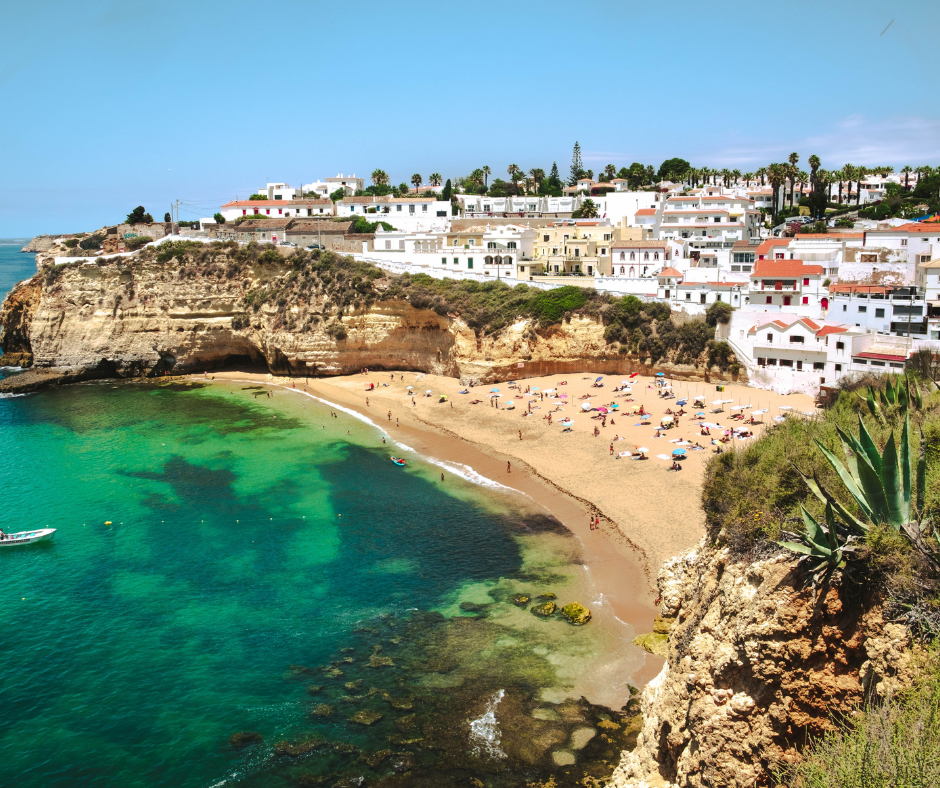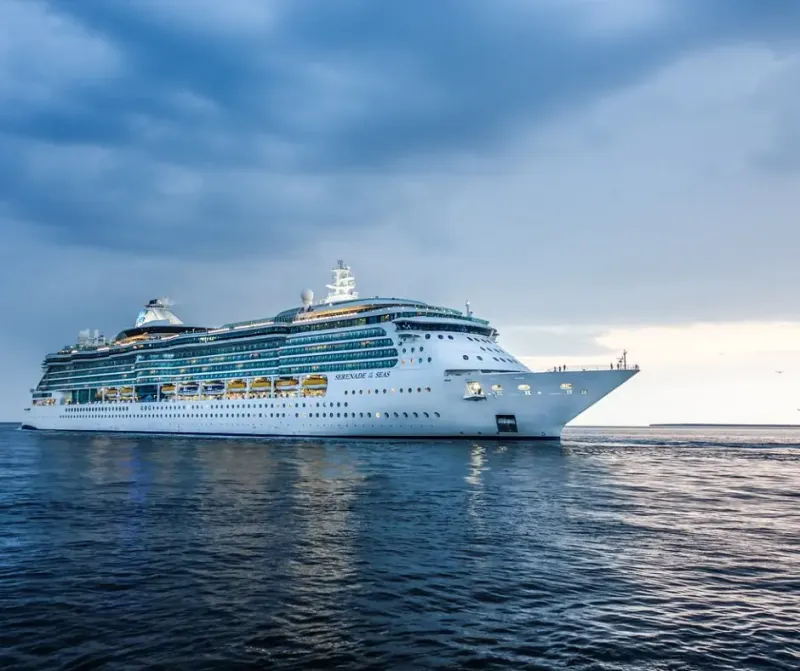Have you ever thought of taking a cruise as a digital nomad? When thinking of cruise ships, you might think of elderly couples tanning at the pool deck, sipping sparkling wine, and playing boccia.
This picture might be correct for some cruise lines. However, there are numerous cruise lines that cater to vastly different crowds. From the elderly adventurer to the once-in-a-lifetime explorer, from the newly retired free boomer to the family holiday. Different cruise lines attract different people.
And then there is the question of purpose. Why do you want to do a cruise? There are many reasons to choose a cruise ship. A cruise can serve as an alternative form of transportation to planes.
It can be a form of cheaper accommodation that takes you to islands you would typically never want to spend the money on.
A cruise can be a place to join pool parties, pilates classes, and ping pong competitions. But it can also be simply a place to relax and recharge.
Let's see how to find your ideal cruise line and what to think about when going on a cruise.
🌱 Travel health insurance for cruises
🛟 13 tips when taking a cruise as a nomad
#1 Use the cruise as a form of transport
When you want to travel from one continent to another, such as from Europe to Latin America or the USA, a cruise can be a well-spent alternative to plane tickets, accommodations, and food.
At first, cruises appear to be luxurious expenses. However, if you invest time in researching, you can find discounts of up to 80% off the price. It is possible to find cruises from Miami to the Caribbean and back to Miami for less than $300. This includes transportation, accommodation, food, drinks, and the travel experience, of course.
You can find 14-day transatlantic cruises for less than $700 (well, that excludes the internet in most cases), especially when looking into repositioning cruises.
The point is, if you want to go from A to B anyway, a cruise doesn't need to break the bank. In many cases, when calculating through the expenses you would have anyway, it can work out.
And, of course, in many cases, it is significantly cheaper to stay overnight on a cruise ship instead of flying to the Bahamas and spending a few nights there, or flying to Norway, renting a car, and driving to the fjords yourself.
#2 Choose your cabin wisely
If you are afraid you are sensitive to the ship's motions, you might want to choose a cabin in the middle of the ship. A ship with 14 decks, for example, shows the least motion on decks 4-9. If you choose deck 5, for example, ensure that you are neither near the front nor the back of the ship. You want to have a cabin in the middle of deck 5.
Of course, cabins on lower decks are cheaper than cabins on upper decks.
#3 Buy your daily must-haves before the cruise
Most things you can purchase on the cruise will be a lot more expensive than on land. If you love chocolate, make sure you stock up for the entire cruise. The same applies to sun cream, hygiene or beauty items, electronics, and alcohol.
Yes, alcohol. Some cruise lines allow a small amount of alcohol to be brought on board the ship. For example, Celebrity Cruise Line and Norwegian Cruise Line allow you to bring one bottle of wine per person. However, note that if you want to enjoy the wine at a restaurant, you will typically pay a corkage fee. It might be better to open the bottle only in the public areas on the ship.
#4 Book the internet package beforehand
When taking a cruise as a digital nomad, rather than a vacationer, you may want to consider purchasing internet packages.
Cruise ships have updated their internet access and use Starlink. If you can choose between a Standard and a Premium version, please note that the Standard version offers limited functionality. If you need internet for calls, uploading and downloading media, or any other purpose beyond just email, you will need the Premium version, which can be pretty expensive. However, it is worth it and reliable. I used the Celebrity Premium package on a transatlantic cruise, and it was really stable and fast.
Cruise lines, such as Virgin, for example, include internet packages in their ticket fees. Other cruise lines, such as Norwegian Cruise Line, Celebrity, Princess Cruise, etc., make you pay between $15 and $40 per day.
Internet packages will not get cheaper once you are on board. You should check if the package is cheaper before boarding. You can simply call the cruise line and ask them.
#5 Check in early and take part in raffles
Maybe you think that sounds silly, but if you check in early, you can take part in raffles in many of the ship's areas. You can attend raffles to win onboard credit, spa vouchers, dining discounts for specialty restaurants, free wine tasting, and more.
Additionally, checking out the different areas of the ship as an early boarder might give you access to discounts. The cruise lines are generous on the first day; make sure to take advantage of it.
#6 Ask for an upgrade
The advantage of checking in early is the possibility of an upgrade. When you kindly ask Guest Relations if there is a way they could upgrade you to a different room category, there is a good chance they will accommodate your request.
#7 Take the automatically added tips off your bill
On some cruise lines, it is possible to opt out of the automatically added tips (gratuity) by removing them from the bill. I don't want to delve too deeply into the topic of tipping. But as a European, tipping is not a mandatory concept. We tip when we receive the extra mile of service, and not just by default.
And I am not saying I don't tip, but I don't want to encourage businesses to pay low wages (like waiters in the USA, for example, who sometimes get only $4 per hour), and it is up to the customer to make up for that miscalculation. No no. I tip 10% only for fantastic service.
Back to the cruise, so cruise lines will charge you something around $10 to $20 daily (!) as added gratuity. You can ask the guest relations to take that off, and you decide (like an adult) at the end how much you want to tip and give the guest relations cash in an envelope at the end of the cruise.
PS: I had conversations with crew members about their salaries. In many cases, crew members can save up all their wages, and after working 3-4 seasons on a cruise ship, they can use these savings to start a business in their home countries. Cruise lines are not contributing to modern slavery; that is a misconception. There are far worse industries (and countries) in the world that exploit their workforce (stadiums built for the Football World Cups, for example).
#8 Walk, walk, walk
The number of decks and the overabundance of elevators make it hard to choose the abandoned staircases. You probably only meet crew members on the staircases. And they know why: The average cruise guest gains 3 kg per week.
Add the fact that all meals are included, food is available 24/7, and people tend to celebrate being on a cruise with cocktails and sparkling wine, and you can see that 3 kg is just the beginning.
You can avoid gaining weight with these simple tricks:
- Stick to your "normal" diet. If you want to sample all the buffet choices, take small plates and opt for tiny portion sizes.
- Switch from white wine to red wine and keep the cocktail and beer rate low. Don't purchase alcohol packages. They are not just costly, but you need to drink a lot to make them worth the money.
- Promise yourself to never use the elevator, but visit every deck every day, and make it a habit to get to know every corner of the ship.
- Use the free gym and take advantage of the running track.
- Join free dance classes and tournaments if they offer something that interests you.
- Go for regular walks on the ship. Walk up and down the decks, from the front to the back, and get your 10,000 steps a day.
- When visiting a port, check the distance to the sights you want to visit on Google Maps and walk as much as possible.
#9 Make use of all the free stuff
Cruises tend to be expensive, especially when booked spontaneously and through the wrong websites (although there are amazing websites that offer regular deals up to -90% and the cruise becomes less expensive than traveling on land, considering transport, accommodation, and food.
To get the best value for your money, make the most of all the free offerings: the gym, theatre, shows, live music, lectures, raffles, tastings, presentations, pool, ping pong, and pool billiards tables.
#10 Don't pre-book land excursions
This depends on your itinerary. When visiting places like Bermuda or European city ports, I don't see the value in joining the land excursions. Check beforehand how far the port is from the sights you want to see, and organize yourself accordingly.
When in Europe, you can use public transport or walk from the port right into the city, for example, in Barcelona.
In other destinations, such as Bermuda or the Bahamas, you can use the local bus and drive around the island. Just keep in mind that if you miss to return on time, the ship won't wait. If you are late, they will leave you behind.
#11 Track your expenses daily
If the cruise line offers an app, utilize it to track your daily expenses. You might think the daily cappuccino is not worth tracking, but when you pay $6 for each cup, it adds up.
#12 Avoid the shops and the casino
Cruise lines can be very pushy in trying to upsell their services, such as spa treatments, luxurious items in the onboard shopping deck, and casino tickets.
Spending money on these upsells is always to your disadvantage. From spa treatments to designer bags, you will always pay a high price for them.
And, of course, avoid going to the casino.
#13 Join social dinner tables
Depending on the cruise line, it is possible to ask guest relations to seat you at a social table. Here, you join a table of other cruise guests who simply want to mingle and meet people.
💝 Conclusion
Taking a cruise comes with many misconceptions. I would have never considered taking a cruise. However, my partner kept talking about it, and eventually, I found myself on a transatlantic cruise, which was just amazing.






